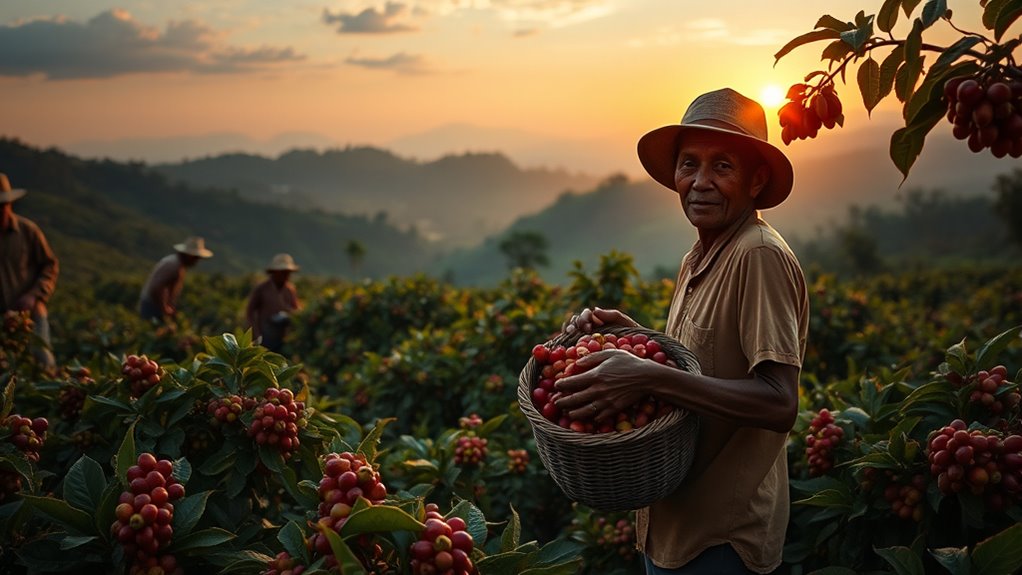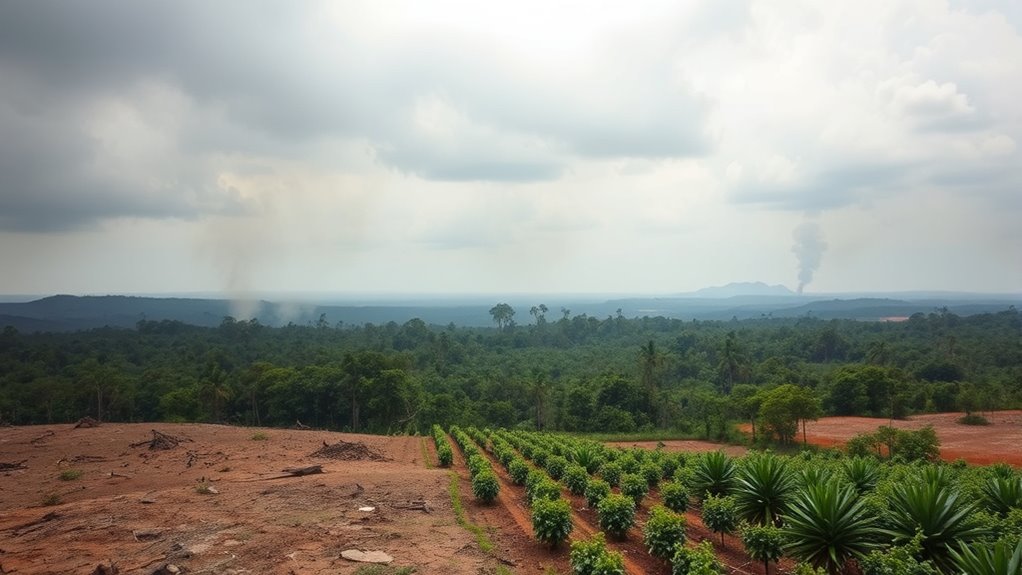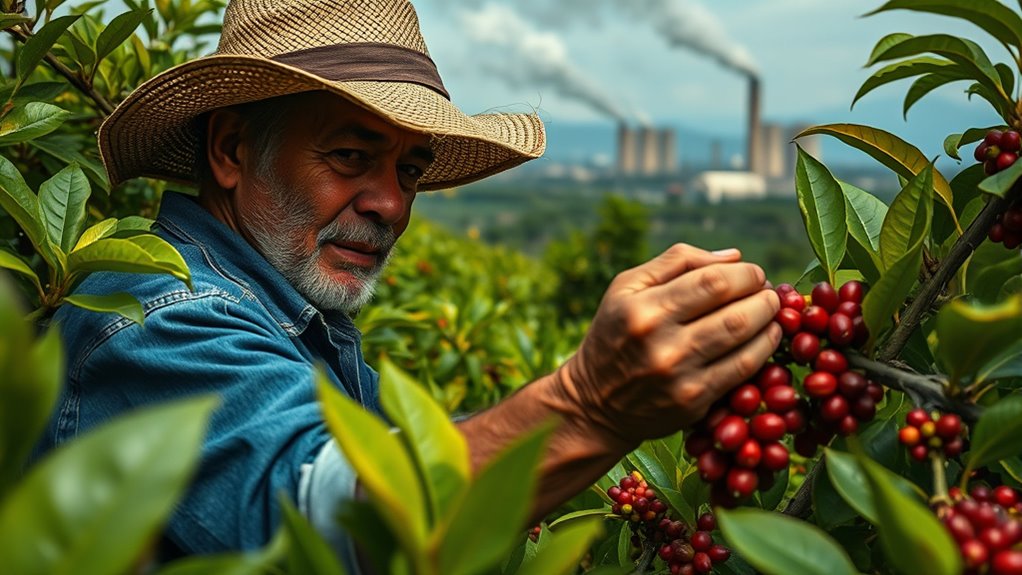Behind your morning coffee lies a hidden cost—farmers often earn less than a living wage due to low prices, forcing them to cut corners on sustainability and labor rights. Cheap coffee production can lead to environmental harm, like deforestation and water pollution, while certification schemes frequently fall short in ensuring fair practices. To truly understand the ethics involved, explore how consumer choices and improved standards can make a difference, and discover more about the impact of your cup.
Key Takeaways
- Low coffee prices pressure farmers to cut costs, leading to environmental degradation and unsustainable land management.
- Exploitative pricing cycles and limited wages trap farmers in poverty, undermining fair labor practices.
- Certification schemes often lack rigorous oversight, allowing unethical practices to persist in coffee supply chains.
- Unsustainable farming methods, driven by cheap inputs, cause soil erosion, deforestation, and water pollution.
- Consumers can support ethical coffee by choosing certified brands and advocating for fair wages and sustainable practices.
The Impact of Price on Coffee Farming Practices

When coffee prices drop, farmers often feel pressured to cut costs wherever they can. This squeeze influences coffee cultivation practices, pushing farmers to adopt cheaper methods that may harm long-term sustainability. To stay afloat, they might prioritize quick yields over quality, reducing investments in soil health or pest management. Pricing strategies become a pivotal factor, as farmers often accept lower prices to secure buyers, fearing they’ll lose income otherwise. These lower prices can lead farmers to cut corners, sacrificing environmentally friendly practices for immediate financial survival. As a result, the focus shifts from sustainable growth to short-term profit, which can degrade land and reduce future harvests. The economic pressures directly shape farming practices, often at the expense of the environment and farmers’ livelihoods. Additionally, soil health is often compromised due to the use of cheap inputs and neglect of proper land management techniques. Furthermore, adopting unsustainable farming methods can accelerate land degradation, making it even harder for farmers to maintain productive crops in the future. Recognizing the importance of ethical farming practices is crucial for ensuring long-term viability and environmental preservation. Maintaining proper land management is essential for preventing further degradation and supporting sustainable agricultural practices.
Exploitation and Fair Wages in the Coffee Industry

You might be surprised to learn that many coffee farmers earn far less than they need, creating stark wage gaps. When prices stay low, farmers struggle to make a living, often leading to exploitation. Choosing ethical coffee guarantees fair wages and supports better conditions for everyone in the supply chain.
Wage Disparities Among Farmers
Despite producing the coffee many of us enjoy daily, farmers often receive only a fraction of the final retail price. This creates significant wage disparities among farmers, affecting their livelihoods. You might not realize that small-scale farmers frequently earn well below a living wage, while middlemen and retailers capture most profits. To understand this better:
- Many farmers receive less than $2 per day, jeopardizing their basic needs.
- Wage gaps exist between large plantations and smallholder farmers, widening inequality.
- Limited bargaining power prevents farmers from securing fair wages, perpetuating poverty.
- Implementing portion control and fair trade practices can help improve income distribution for farmers.
These wage disparities threaten farmer livelihoods and keep them trapped in cycles of poverty. Addressing these issues is vital to fostering fairer income distribution and supporting sustainable coffee farming communities. Additionally, fair wages are essential for ensuring that farmers can invest in better farming practices and community development.
Impact of Low Pricing
Low coffee prices often mean farmers are paid little for their labor, which fuels exploitation in the industry. This impacts the entire coffee culture you enjoy, from traditional brewing methods to modern espresso drinks. When prices stay low, farmers struggle to earn fair wages, making it hard to invest in sustainable farming practices or improve working conditions. As a result, the quality of coffee can suffer, affecting your brewing methods and the richness of your morning ritual. Cheap coffee often comes at the expense of those who produce it, creating a cycle where exploitation persists. Additionally, the lack of fair compensation can hinder farmers’ ability to adopt proper cultivation techniques, further impacting coffee quality. By understanding this impact, you can become more conscious about the choices you make, supporting brands that prioritize fair wages and ethical practices in every cup. Recognizing the connection between pricing and ethical sourcing can also deepen your appreciation for craftsmanship and integrity in different industries.
Ethical Coffee Sourcing
Ensuring ethical coffee sourcing means actively supporting practices that prioritize fair wages and fair treatment for farmers. When choosing brands, look for those committed to transparency and ethical standards, which influence coffee branding. Fair compensation allows farmers to invest in better living conditions and sustainable farming. To promote ethical sourcing, consider these steps:
- Research Coffee Brands: Choose companies that openly share their sourcing practices and guarantee fair wages.
- Support Direct Trade: Buy from roasters who work directly with farmers, ensuring fair pay and quality control.
- Understand Roasting Techniques: Ethical sourcing often correlates with better roasting methods that preserve coffee’s integrity, benefiting both farmers and consumers.
Environmental Consequences of Cheap Coffee Production

Cheap coffee production often comes at a significant environmental cost, as farmers and companies cut corners to keep prices low. To reduce costs, many neglect sustainable practices like organic farming, which minimizes chemical use and protects soil health. Instead, they rely on harmful pesticides that pollute water sources and harm ecosystems. Water conservation also takes a hit, as producers often overuse water for irrigation, depleting local supplies and harming nearby wildlife. Deforestation is another major issue, with forests cleared to create new plantations, leading to habitat loss and increased carbon emissions. These shortcuts accelerate environmental degradation, threaten biodiversity, and contribute to climate change. Additionally, unsustainable farming practices can lead to soil erosion and reduced land productivity over time. By choosing cheaper coffee, you’re indirectly supporting practices that damage the environment. It’s a costly trade-off that affects everyone in the long run. Recognizing the importance of environmental sustainability can help consumers make more informed and ethical choices. Supporting ethical farming initiatives can promote better environmental stewardship and long-term ecological health.
Certification Schemes and Their Limitations

Certification schemes aim to guarantee fair practices, but gaps in standards often leave issues unaddressed. Verifying compliance remains challenging, making it hard to trust claims fully. As a result, farmers may still face exploitation despite these certifications. Additionally, support hours for oversight and enforcement can be limited, further complicating efforts to ensure ethical practices. Moreover, the variability in certification standards across programs can lead to inconsistencies in how ethical practices are assessed and enforced. In some cases, the lack of comprehensive auditing procedures can undermine the credibility of certification claims. Implementing strict monitoring protocols is essential to strengthen the integrity of these certification systems. Advances in traceability technology could also improve transparency and accountability within certification processes.
Certification Standards Gaps
While certification schemes aim to guarantee ethical and sustainable coffee production, they often fall short due to inherent limitations. These gaps can undermine farmer livelihoods and weaken certification credibility. Additionally, the lack of comprehensive standards for labor practices can allow exploitation to persist despite certification efforts. For example, some certifications may not fully address issues related to working conditions or fair wages, which are crucial for truly ethical practices. Moreover, the absence of continuous learning in certification processes can hinder the adaptation to emerging challenges in the coffee supply chain. These gaps can undermine farmer livelihoods and weaken certification credibility. Without standardized safety protocols, risks to workers’ health and safety may go unaddressed, further compromising ethical standards. These gaps threaten to erode trust in certification labels, making it harder for consumers to identify truly ethical coffee choices and for farmers to benefit from sustainable practices. Improving transparency and accountability within certification schemes is essential to close these gaps and ensure ethical integrity.
Verification Challenges Persist
Have certification schemes truly proven effective at verifying ethical and sustainable practices on the ground? Not quite. Verification challenges remain a significant hurdle, as many schemes rely on self-reporting or limited inspections. This creates authenticity concerns, where certifications may not accurately reflect the true conditions of farms. Different regions and producers face varying levels of oversight, making it easy for unethical practices to slip through the cracks. Certification labels can give a false sense of security, but without consistent, rigorous verification, their credibility is compromised. You might wonder if your coffee truly comes from ethically managed sources. The truth is, the current verification system struggles to keep pace with complex supply chains, leaving many ethical violations unaddressed. This ongoing challenge questions the reliability of certifications you see on your morning brew.
Impact on Farmers
Verification challenges often cast doubt on the true impact of certification schemes on farmers. While fair trade aims to improve farmer livelihoods, its effectiveness isn’t always guaranteed. Here are some limitations to contemplate:
- Limited Reach: Certification programs often cover only a small percentage of farmers, leaving many still vulnerable to low prices.
- Cost Barriers: The expenses associated with obtaining and maintaining certification can be prohibitive, especially for smallholders.
- Quality vs. Impact: Certification may focus more on compliance than genuinely enhancing farmers’ well-being, leading to superficial improvements.
These issues highlight that, despite good intentions, certification schemes sometimes fall short of delivering lasting benefits to farmers and their communities.
How Consumers Can Make Ethical Coffee Choices

Wondering how you can make more ethical coffee choices? Start by paying attention to coffee marketing and labels. Look for certifications like Fair Trade, Organic, or Rainforest Alliance, which signal ethical practices. Educate yourself about the origins of your coffee—know where it’s grown and how farmers are treated. Increasing consumer awareness helps you distinguish between brands that prioritize sustainability and those that don’t. Try to buy from local roasters or companies committed to ethical sourcing. Reduce impulse purchases by researching before buying. Engaging with brands that promote transparency encourages ethical practices in the industry. Small choices, like selecting ethically sourced coffee, can make a significant difference in supporting farmers and fostering fair labor conditions.
Supporting Sustainable and Fair Trade Coffee Initiatives

Supporting sustainable and fair trade coffee initiatives is a powerful way to guarantee your coffee choices positively impact farmers and ecosystems. By choosing brands committed to transparency, you can assure your money supports ethical practices. Here are three ways to get involved:
Supporting fair trade coffee ensures ethical practices and positive impacts on farmers and ecosystems.
- Research coffee marketing claims to verify if brands genuinely prioritize sustainability or just use greenwashing tactics.
- Support brands with transparent sourcing, so you know where your coffee comes from and how farmers are compensated.
- Buy from certified fair trade or organic suppliers that prioritize environmental health and fair wages.
Taking these steps helps promote ethical coffee production while encouraging brands to prioritize transparency. Your choices directly influence the industry’s shift toward sustainability and fairness, making your morning brew more meaningful.
Frequently Asked Questions
How Does Coffee Pricing Influence Farmers’ Quality of Life?
You influence farmers’ quality of life through coffee pricing by supporting fair trade practices and paying living wages. When you buy ethically sourced coffee, farmers earn more, which helps them afford better healthcare, education, and improved living conditions. Lower prices often mean farmers struggle to make a decent income, perpetuating poverty. By choosing fair trade, you guarantee farmers receive fair compensation, ultimately enhancing their well-being and community stability.
Are There Hidden Environmental Costs in Cheap Coffee Production?
Sure, your cheap coffee might seem like a steal, but it’s secretly a villain in disguise. Behind the scenes, it causes environmental degradation and resource depletion, turning lush farms into barren wastelands. As you sip, remember that this “bargain” often fuels deforestation, water loss, and soil erosion. So, next time you buy that low-cost brew, consider whether you’re funding a future where coffee’s only option is a sad, dried-out desert.
Do Certification Labels Guarantee Ethical Practices?
Certification labels like Fair Trade can help guarantee ethical practices, but they don’t guarantee perfection. When you see these labels, you’re supporting producers who follow certain standards for fair wages and sustainable farming. However, it’s vital to remember that not all labels are equally strict or verified. Always research the certification to understand what it truly guarantees, so you can make more informed, ethical choices with your morning coffee.
How Can Consumers Identify Truly Sustainable Coffee Brands?
Imagine sipping coffee from a lush, vibrant farm where Fair Trade practices thrive, and transparency standards shine like sunlight through leaves. To find truly sustainable brands, look for certifications like Fair Trade and Organic, and check if they openly share their sourcing stories. Trust brands committed to ethical practices, because their transparency shows they prioritize fair wages, eco-friendly methods, and community well-being—making your morning brew a choice you can feel good about.
What Policies Could Improve Fairness in the Coffee Supply Chain?
You can improve fairness in the coffee supply chain by supporting policies that promote Fair Trade certifications, ensuring farmers receive fair wages and work under ethical conditions. Implementing transparent supply chain practices helps trace coffee origins and holds companies accountable. Encouraging government regulations and industry standards focused on fairness can also protect farmers and workers, making the entire supply chain more equitable and sustainable for everyone involved.
Conclusion
Next time you reach for that cheap coffee, remember the hidden costs behind it. For instance, a small farmer in Colombia might struggle to pay fair wages, risking exploitation just to meet demand. By choosing ethically sourced beans, you help support fair wages and sustainable farming practices. Your simple act of selecting fair trade coffee can make a real difference—protecting farmers, the environment, and ensuring you enjoy your morning brew with a clear conscience.









